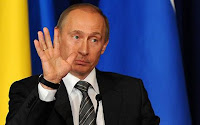In 1940 the Soviet NKVD under Stalins' orders executed more than 16,000 Polish Officers in the forests near Smolensk, Russia. Three years later the Germans discovered the mass graves and denounced the Soviets as the perpetrators. The Soviets adamantly denied it, and enjoyed the protection of its allies Great Britain and the United States, whose tacit support ensured that the controversy would remain obscure for decades.
 | |||
| Exhumed bodies of Polish Officers massacred at Katyn 1940 |
 |
| Mikhail Gorbachev |
In April 1990 President Mikhail Gorbachev gave State secret documents to the Polish President, which contained information that proved irrefutably that the Katyn Massacre was carried out by the Soviet secret police, and not the Germans. The USSR publicly expressed "profound regret". Gorbachev stated, "It is not easy to speak of this tragedy, but it is necessary." His gesture, and the admission of Soviet guilt, was unprecedented in the history of Russian-Polish relations. But despite these revelations, and the subsequent release of more secret Soviet documents about Katyn, the spectre of Russian conspiracy prevailed.
In September 2004 the Russian government promised that information relating to the Katyn Massacre would be submitted to Polish officials as soon as the documents became "declassified". Surprisingly, in March 2005, the Prosecutor-General's Office declared that the investigation was officially discontinued, that the reasons for so doing was itself a State secret, and that such documents were inaccessible to foreign nationals. The Russian authorities refused to even provide a copy of their decision to discontinue proceedings. In the meantime out of a total of 183 volumes of files which had been accumulated by the Russian investigative team, there remained 116 volumes still classified as top secret. (NB. On April 7, 2011 the Soviets handed Poland eleven more volumes of declassified documents related to Katyn.)
 |
| Soviet declassified documents regarding the Katyn Massacre April 7, 2011 |
 |
| Alexander Savenkov |
It was therefore not surprising that the Russian government refused to cooperate during the ECHR proceedings. The Court charged the Russian government with a breach of Article 38 of the Convention for the Protection of Human Rights and Fundamental Freedoms, which stipulates that all parties to a case must submit "all necessary facilities" to the Court upon request. The Russian government did not.
The court proceedings were fraught with an endless array of Russian-style tactics of evasion and lies, rebuttals, and stonewalling. For example in 2003, Mr. Szewczyk, the lawyer representing Mr. Janowiec, applied to the Prosecutor General of the Russian Federation, with a request for access to documents related to Mr. Janowiec, and two other persons. The Russian office denied access to such information on the grounds that "documents could only be given to the officially recognized victims or their representatives." Despite repeated attempts, the applicants' lawyers were unable to obtain such recognition for their clients.
The Russian propensity to wield contradictions and ambiguity was particularly frustrating to the Court and painful for the Applicants to bear. Note that in April 2007 the Military Court of the Moscow Command concluded that there were no legal grounds to assume that Mr. Janowiec and others were victims of the massacre. According to Russian authorities their names were listed among the prisoners at Starobelsk camp, but their remains had not been identified during the investigation. And since their bodies had not been identified, there was "no proof that the applicants' relatives had lost their lives as a result of the crime of abuse of power (Article 193.17 of the 1926 Soviet Criminal Code.) In essense, the Russian defense claimed that the whereabouts of the victims were unknown, as though they had "vanished." However, on June 23, 2003, the Prosecutor General's Office declared that an investigation completed in 1991, in which 200 bodies were exhumed from the Smolensk area, resulted in the identification of "some of them including Mr. Nawratil and Mr. Janowiec". In 1943, of a total of 4,243 bodies exhumed near Katyn, 2,730 were identified. Among them were the bodies of relatives of the claimants in the proceedings.
 |
| Vladimir Putin |
The ECHR asserted that a denial of crimes against humanity is counter to the fundamental values of the Convention, and of democracy. The Russian response runs contrary to these fundamental values, and "demonstrated a callous disregard for the applicants' concern and deliberate obfuscation of the circumstances of the Katyn Massacre."
Russian unwillingness to cooperate with the ECHR and their refusal to make full disclosure about Katyn, have not contributed one iota to improving Russian-Polish relations. It has accomplished the reverse. It has elicited a heightened degree of suspicion, distrust, and hostility towards the Russian government, feelings which are unlikely to recede unless the Russian government, and in particular, President Putin, shore up the courage to speak the Truth, the Whole Truth, and nothing but the Truth.
 |
| MEMORIAL TO VICTIMS OF KATYN MASSACRE, SMOLENSK RUSSIA |
The complete transcript of the Judgement of the ECHR, dated April 16, 2012, is available on line. Please click here.
No comments:
Post a Comment